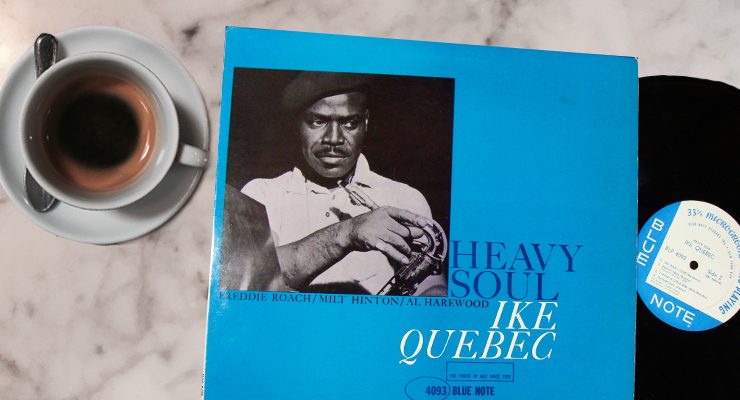In a quiet, darkened room, a group of strangers waits together. Blood-red burlap covers the walls, and overhead three huge, curved panels of walnut wood hang pendulously, reflecting sound waves back into the room. Ukiyo-e prints set in front of the windows diffuse the light from outside, the longer springtime hours threatening to dispel the evening mood inside the room. But fortified with tumblers of Nikka whisky and mugs of hot coffee, amid the tangible hush of a music studio, the anticipatory tension in the room holds. At the front of the room, the glowing glass tubes of the analog amps hum almost imperceptibly; there is the quiet brush of a sleek, black vinyl record, so shiny that it is iridescent, being taken from its sleeve. The turntable belt begins to run; the needle lowers slowly. For a few seconds, the incredible auditory warmth of the popping and crackling, the “silence” before the song, fills the room. The first strains of Hank Mobley’s “Soul Station”, Blue Note album 4031, fill the room and jazz transports the listeners to another place.
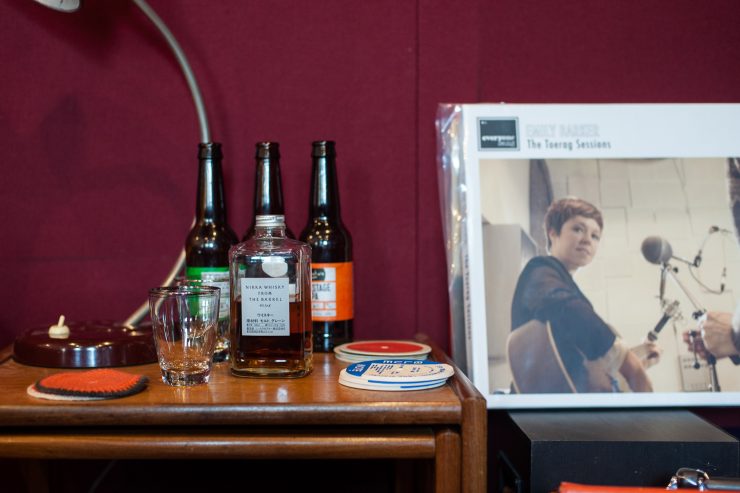
If you’ve heard of a jazz kissaten, the famous jazz cafes of Japan, you might imagine this scene taking place in Tokyo. But this room isn’t in Shibuya or Roppongi—it’s on an industrial estate in North London, Tileyard, at a place called Gearbox Records.
Tileyard is home to many music studios which record everything from radio shows to drum & bass to pop, but Gearbox stands out amongst the masses. They are an all-analog, vinyl mastering and recording studio, specializing in previously unreleased jazz records. Though they’ve expanded their repertoire into electronica and folk since their inception in 2009, they’ve gained attention as proprietors of rare jazz on beautifully mastered vinyl, eschewing the streamlined new digital ways of the many studios surrounding them. Their commitment to analog ensures that each record is suffused with the rich, warm sounds of live music, something that many vinyl audiophiles can feel is lost in today’s digital, super clean recording processes. Going along with this aesthetic, their website claims they are also committed to “put the ritual back into music listening” which might partly explain why owner Darrel Sheinman began running jazz kissaten nights at the studio last year. Jazz? Ritual? Add some whisky and coffee, and you’ve got yourself a kissaten.
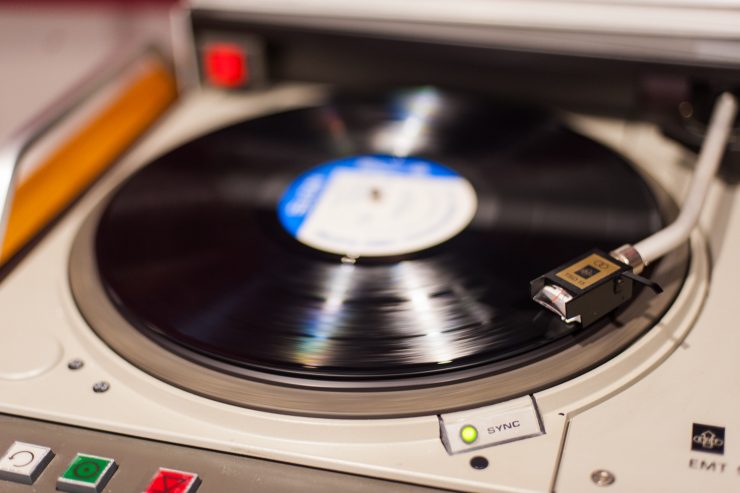
Though they were introduced as early as the Meiji Era (late 1800s), Japan’s jazz cafes really rose to prominence in the 1960s. In a time when Japan was in the grips of a jazz obsession, and vinyl records could cost almost an entire month’s salary, kissatens were an easy way to get your musical satisfaction without investing in astronomically costly hi-fi systems and records. Kissatens—mostly playing jazz, though many sprung up pandering to other musical tastes and genres, such as rockabilly—were a place for people to go and listen to music in companionable silence, enjoying coffee or whiskies. In this way, anyone could afford the luxury of listening to high fidelity, beautiful music whenever they pleased.
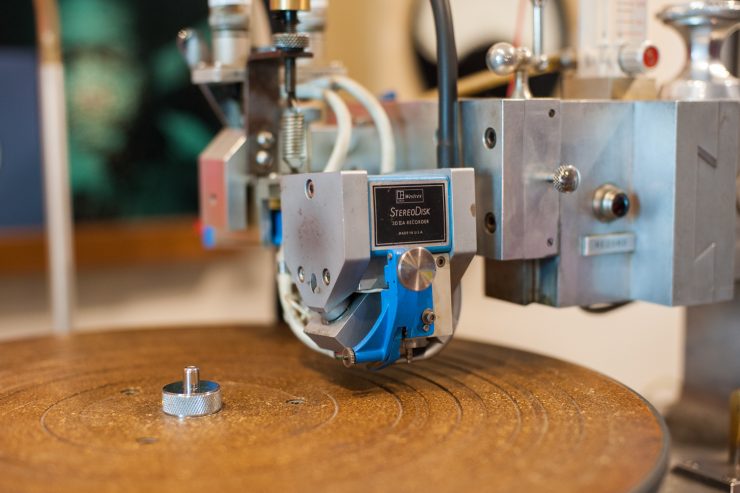
Sheinman, who visits Japan every year to brush up on his martial arts training, visit clients, and indulge in Japanese jazz culture, wanted to bring this experience back home for others to enjoy. He entertains 10 lucky people at a time, who for £10 can enjoy the rarest of jazz records, a measure of fine Japanese whisky, and cups of Notes coffee (whose roastery is located in Tileyard as well) in the company of other audiophiles, jazz buffs, and curious souls. The studio itself is tiny, so it’s not surprising that the kissaten nights aren’t a bigger affair—it’s almost certain that Gearbox could sell many more tickets to such a unique event as this. However, the intimate nature of the gathering only serves to underscore the awe-inducing space in which attendees find themselves. You are surrounded by hulking relics of 20th-century analog mastering and recording equipment; Val Wilmer’s pictures of jazz and blues legends like Ronnie Scott, Jack Owens, and Sonny Rollins; a 500-strong collection of the world’s rarest jazz records, from the Blue Note label, some of which fetch up to £5,000 at auction; and at the center of all the attention is Gearbox’s £75,000 Audio Note hi-fi setup, encased in gorgeous, vibrant rosewood. This is the stuff jazz dreams are made of, and in true kissaten spirit, is something most people could never even hope to own—which is exactly why Sheinman wants to share.
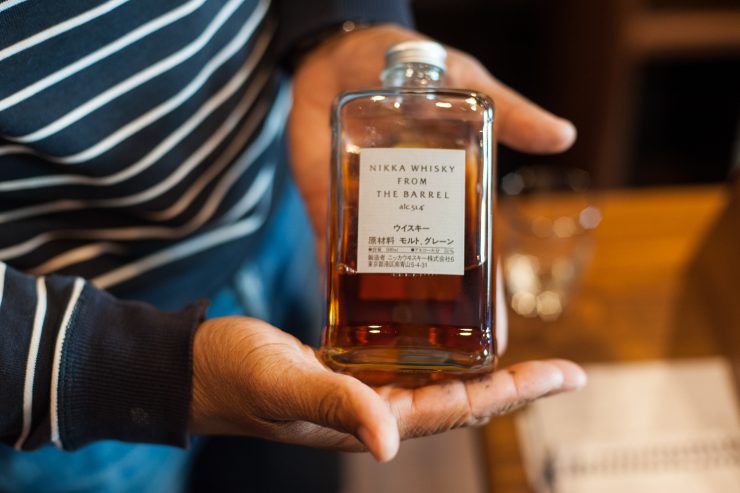
Whether you’re lured in by the promise of fine music, fine whisky, or fine coffee, it’s certain that Gearbox Records’ jazz kissaten nights will intrigue you and linger in your mind long after the final smoky saxophone notes drift away and the burn of Nikka fades on your tongue.
Gearbox Records run jazz kissaten nights every once in a while. Keep an eye on their Twitter @GearboxRecords for details.
Kate Beard (@SBinLondon) is a Sprudge staff writer based in London. Read more Kate Beard on Sprudge.
The post A Coffee Service Like No Other At London’s Jazz Kissaten appeared first on Sprudge.


